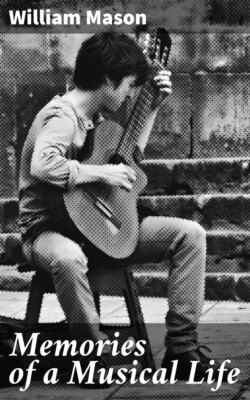Читать книгу Memories of a Musical Life - William Mason - Страница 25
На сайте Литреса книга снята с продажи.
MORITZ HAUPTMANN
ОглавлениеTable of Contents
Autograph of Mme. Schumann
My teacher in harmony and counterpoint was Moritz Hauptmann, a pupil of Spohr, and an excellent composer of church music, his motets being especially beautiful. He was the cantor and music director of the Thomas-schule at Leipsic, a position which years before had been held by Sebastian Bach. He was altogether a genial and attractive man, of gentle manner and disposition, and I at once became much attached to him. He was in delicate health and suffered constantly from dyspepsia, yet bore all of his ills with patience and equanimity. I remember that he had a passion for baked apples, one of the few things he could eat without ill results, and on his stove, a regular old-fashioned German structure of porcelain, nearly as high as the ceiling, there was always a row of apples in process of slow baking.
His autograph is one of the most curious in my book, and is an excellent example of his technical knowledge. It is a Spiegel-Canon ("looking-glass canon"). When held up to the mirror the reflection shows the answer to the canon in the related key.
Not long after beginning my studies under Hauptmann, I received from my father a copy of his latest publication, being a collection of tunes, mostly of his own composition, for choir and congregational use in the church. He requested me to show this to Hauptmann and get his opinion, if practicable. I felt a decided reluctance to do this, because I thought my father's work was not worthy of the notice of such a profound musician, so I delayed the carrying out of his request. After a few weeks, however, I began receiving letters from my father upon the subject, and realized that I could not postpone action any longer. So one day, going to my lesson, I took the book with me. I kept it as well out of sight as I could during the lesson, and then at the last moment, when about to leave the room, I placed it on Hauptmann's table, telling him in an apologetic way of my father's request and seeking to excuse myself for troubling him. I said I was afraid he would find nothing in the book to interest him.
When the regular time for my lesson recurred I hesitated to present myself again; but there was no way of avoiding the difficulty, so with a tremendous exercise of will I faced the situation. What was my surprise and relief when he greeted me with "Mr. Mason, I have examined your father's book with much interest and pleasure, and his admirable treatment of the voices is most musicianly and satisfactory. Please give him my sincere regards, and thank him for his attention in sending me the book."
At the moment I could not understand how such a big contrapuntist could express himself in such strong terms of approval; but I knew him to be genuine, and so I straightened myself up and really began to be proud of my father. Another and more important result was the recognition of my own ignorance in imagining that a thing in order to be great must necessarily be intricate and complicated. It dawned upon me that the simplest things are sometimes the grandest and the most difficult of attainment.
I also took lessons in instrumentation from Ernst Friedrich Richter, a pupil of Hauptmann.
